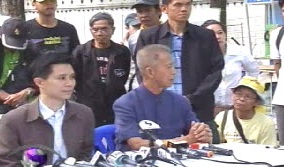Phnom Penh labels demand 'provocative'
31/01/2011
Bangkok Post
Prime Minister Abhisit Vejjajiva is insisting that any Cambodian flag flying above disputed areas must be removed, despite Phnom Penh denouncing the call as "insulting and unacceptable".
The Cambodian Ministry of Foreign Affairs has issued a statement criticising Mr Abhisit's demand, saying the call, in parallel with Thai military exercises last week near the border, was provocative.
Mr Abhisit called for the removal of the Cambodian flags yesterday during his weekly radio and television address.
Cambodia is flying its national flag near Wat Kaew Sikha Khiri Sawara temple in the disputed 4.6-square-kilometre area near Preah Vihear temple.
Mr Abhisit said the area did not belong to Cambodia and ordered the Thai Foreign Affairs Ministry to protest against Cambodia's announcement that he had violated its sovereignty by ordering the removal of the flag.
The prime minister also reaffirmed yesterday that he would not meet the demands of the People's Alliance for Democracy, which is protesting against the government's handling of the border row.
The PAD is calling on the government to revoke the 2000 memorandum of understanding between Thailand and Cambodia that governs the countries' boundary quarrel, to withdraw from the World Heritage Committee, and to expel Cambodian people from the disputed area.
Mr Abhisit said it was a misunderstanding that the border agreement allowed Cambodia to encroach on Thai territory. He said the memorandum prohibited either country from further intruding on the other's land.
He denied the agreement put Thailand at a disadvantage or meant that Thailand accepted a 1:200,000 border map used by Cambodia. He insisted the memo was drawn up in line with international principles and could help prevent the disagreement escalating into war.
As for the membership of the World Heritage Committee, Mr Abhisit said the past government of Thailand allowed Cambodia to have the Preah Vihear temple listed as a world heritage site, while his government had resisted Cambodia's desire to manage the temple as a world heritage site alone.
Regarding the expulsion of Cambodian people from the disputed area, the prime minister said such a move could trigger retaliations.
The secretary to the foreign minister, Chavanond Intarakomalyasut, said yesterday the Foreign Ministry would issue a letter of protest against Cambodia's statement accusing Mr Abhisit of violating its sovereignty.
"We should help each other avoid conflicts and should not issue any statement that will lead to more conflicts and confusion," he said.































